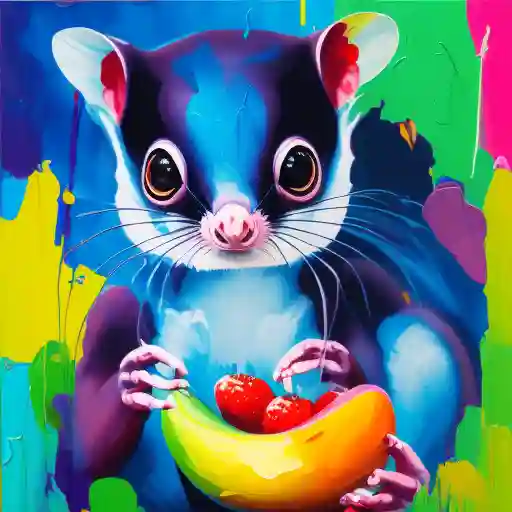Discover whether baby sugar gliders can safely consume carrots, explore their nutritional needs, and learn how to incorporate carrots into their diet responsibly.
Introduction
When it comes to caring for baby sugar gliders, one of the essential aspects is understanding their dietary requirements. As a responsible pet owner, you might wonder, “Can baby sugar gliders eat carrots?” This question showcases your commitment to providing the best care for these adorable marsupials. In this comprehensive guide, we’ll explore the ins and outs of feeding carrots to baby sugar gliders, addressing their nutritional needs, potential benefits, and any precautions you should take. Let’s embark on this exciting journey of nurturing healthy and happy baby sugar gliders!
1. Understanding the Diet of Baby Sugar Gliders
Before we delve into the specific question of carrots, it’s crucial to establish a solid foundation by comprehending the dietary preferences and requirements of baby sugar gliders.
Baby sugar gliders, like their adult counterparts, are omnivores, meaning they consume a diverse diet that includes both plant matter and protein sources. In the wild, their diet primarily consists of nectar, sap, insects, fruits, and the occasional small vertebrates.
2. Exploring the Nutritional Composition of Carrots
Carrots are renowned for their nutritional value in the human diet, packed with vitamins and minerals essential for good health. But how do carrots align with the dietary needs of baby sugar gliders?
Carrots are a rich source of:
- Vitamin A: This essential vitamin is crucial for vision, skin health, and immune function.
- Dietary Fiber: Fiber promotes healthy digestion and can be beneficial in maintaining a balanced diet.
- Antioxidants: Carrots contain antioxidants that help combat oxidative stress in the body.
While these nutrients are undoubtedly beneficial, it’s essential to consider how they fit into the specific requirements of baby sugar gliders.
3. Can Baby Sugar Gliders Safely Eat Carrots?
The short answer is yes, but with some important caveats. Carrots can be incorporated into a baby sugar glider’s diet, but they should not be a primary food source. These sweet and crunchy vegetables should be offered in moderation and as part of a balanced diet.
4. Moderation is Key
When introducing carrots to a baby sugar glider’s diet, moderation is crucial. Carrots are relatively high in natural sugars, and consuming them excessively could lead to weight gain and digestive issues.
It’s essential to cut the carrots into small, manageable pieces to avoid any choking hazards, especially for baby sugar gliders that are still developing their chewing abilities.
5. Variety in Diet
While baby sugar gliders can enjoy the occasional carrot treat, it’s vital to offer them a diverse range of foods to meet their nutritional needs fully. A well-rounded diet for baby sugar gliders may include:
- High-Quality Commercial Pellets: These pellets are specially formulated to provide essential nutrients.
- Fresh Fruits: Offer a variety of fresh fruits, such as apples, bananas, and berries, but ensure that the fruits are free from pesticides.
- Protein Sources: Insects like mealworms and crickets are excellent protein sources for baby sugar gliders.
6. Watch for Allergies or Digestive Issues
Just as with any new food introduced into a pet’s diet, it’s crucial to monitor baby sugar gliders for any signs of allergies or digestive issues. If you notice any unusual behavior or health concerns after offering carrots, consult with a veterinarian experienced in exotic pets.
Frequently Asked Questions (FAQs)
Can baby sugar gliders eat carrots every day?
A: It’s not recommended to offer carrots every day. Keep them as an occasional treat to maintain a balanced diet.
How should I prepare carrots for baby sugar gliders?
A: Cut the carrots into small, bite-sized pieces to prevent choking hazards.
What other vegetables can I offer to baby sugar gliders?
A: Baby sugar gliders can enjoy a variety of vegetables, such as sweet potatoes, bell peppers, and leafy greens, in small amounts.
Can carrots replace other elements of a baby sugar glider’s diet?
A: No, carrots should complement a diverse diet that includes commercial pellets, fruits, and protein sources.
Should I consult a veterinarian before introducing carrots to my baby sugar glider’s diet?
A: Consulting a veterinarian with experience in sugar glider care is always a good idea when introducing new foods.
Are baby sugar gliders more sensitive to certain foods than adults?
A: Yes, baby sugar gliders might be more sensitive to dietary changes, so it’s essential to introduce new foods gradually and monitor their response.
Conclusion
In conclusion, baby sugar gliders can indeed enjoy the occasional carrot treat as part of a balanced diet. It’s essential to offer them in moderation, alongside a diverse range of foods that meet their nutritional needs. Carrots provide valuable nutrients, but they should not replace essential elements of a baby sugar glider’s diet, such as high-quality commercial pellets and protein sources. Remember to watch for any allergies or digestive issues and consult with a knowledgeable veterinarian to ensure the well-being of your adorable baby sugar gliders. With the right care and attention to their dietary requirements, you can provide a happy and healthy life for these charming marsupials.

